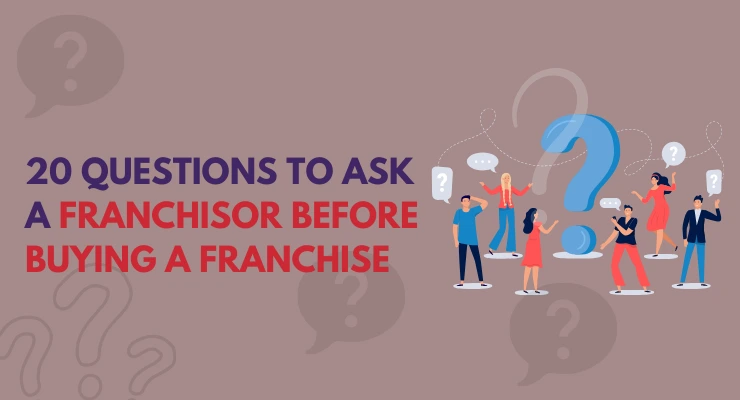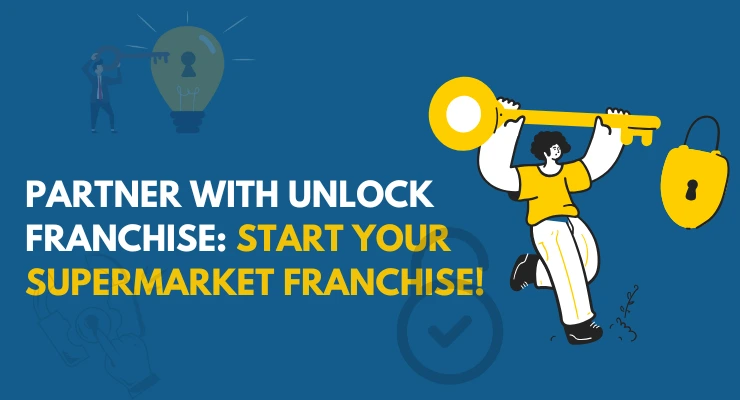
Crucial 20 Questions to Ask a Franchisor Before Buying a Franchise
Questions to Ask a Franchisor! Franchising is exciting because it allows you to run a business alongside an established brand’s name, established processes, and ongoing assistance.
Even so, this privilege comes with responsibilities and risks that need to be weighed carefully before one decides.
Learning what Questions to Ask a Franchisor is one of the steps that need to be taken. Such a discussion will help you analyze the pros, cons, and how suitable a particular franchise is for one.
This is a guide for exploring the 20 significant Questions to Ask a Franchisor you should ask before you sign your name.
It will also enable you to find hidden potential in the franchise and make an informed and prepared investment.
1. What Is the Total Initial Investment Required?
The total initial investment required does not only include the franchise fee itself. Most potential franchisees forget about other costs such as real estate, licenses, permits, equipment, and inventory.
For example,
A fast-food franchise may need specialized kitchen setups, while a retail franchise may incur additional expenses on store layout and design.
Request a detailed breakdown of all costs so you know what capital you have to raise at the beginning and how you will allocate it. Inquire about working capital requirements, too, since they are often ignored.
2. What Are the Current Fees?
Ongoing royalties are common fees that will likely be charged by franchisors. They usually range from 4% to 12% based on the gross revenues of an entity, according to the industry as well as to the brand that is using the franchise.
Oftentimes these fees are accompanied by marketing or advertising fund contributions and are equal to a sales percentage.
Thus, apart from some having a flat royalty fee structure, others use tiered royalty scales that vary as your revenue grows. Clarify such things to avoid any surprises later on and also make sure the margins of your profit stay healthy.
Also Read: Hotel Franchise in India: Investments, Costs Breakdown & How to Apply
3. What Support Does the Franchisor Provide?
Support can come in a wide variety of areas: training, marketing support, operational guidance, and establishing supplier sources.
For example,
Some franchisors have field support, which refers to designated representatives who visit your place of business to offer assistance.
Investigate how specific: Will they assist with geographic delivery? Will they provide training before opening and in ongoing practice?
A franchisor in the gym business might provide training for service and equipment use for employees, while a coffee chain might offer training for baristas and recipes.
4. Nationally and locally, how is brand performance?
Aside from overall performance, inquire about the local market penetration of the franchise and future growth prospects. If the intention is to open a facility in a less-saturated area, know the challenges and opportunities in such areas.
For example,
National parity with good local performance may indicate potential or lack of awareness that either would require strategic effort to tap or build.
5. What Are the Major Challenges Facing Your Industry?
Every industry has its challenges, such as stiff competition, changing customer tastes, or regulations.
For example,
With rising ingredient prices, some franchise companies in food might face major hurdles, while some childcare franchises might consider licensing too tight.
Asking this question from any franchisor can give an idea about the must-know aspects of industry challenges in their strategy of risk minimization.
6. Could You Share a Couple of Success Stories from Other Franchisees?
Success stories would relay instructions about what is possible within this franchise system. Request examples of franchisees who started similarly to you, have little industry experience or are operating in similar marketplaces.
It could be about learning how it’s done in the success stories-franchisor support, unique marketing tactics, or sheer perseverance. It would inform your strategies.
7. What is the failure rate of your franchise locations?
High failures can be a warning sign but understanding the reasons behind that failure is equally important.
For example,
Closures happen for reasons such as improper site selection, underperforming franchisees, or market saturation.
Seek a specific figure in the context to know if the franchise system is healthy or if the failures show some systemic fault.
8. What are your franchise agreement terms?
Franchise agreements are long and complicated, detailing everything from their requirements for operation to their dispute resolution processes.
Some agreements might, for example, require that you operate your franchise for a minimum number of years, with penalties for your premature withdrawal.
Going through this document with a franchise lawyer makes you understand what creditors must bring forth before them and what may come with your franchise.
9. Are There Restrictions on Buying Products or Services?
Many franchisors obligate you to buy goods from approved vendors in order to uphold conformity. This would maximize quality control, although it might lessen the capacity to negotiate a better price or identify other sources.
For instance, that particular franchisor in the hospitality line may provide specific items of furnishings, while, as for a quick-service restaurant franchise, you may not be able to pick your own sources for ordering some ingredients because they stipulate where you’re supposed to buy them.
10. How much money goes into marketing?
Marketing can indeed differ from franchising. Some franchisors will manage general nationwide campaigns, and then there are others that require that local marketing efforts be carried out by the franchisee independently.
See if the past has shown any campaign and the achievements of the campaign as a sample.
Ask what other things can be provided by the franchisor to the franchisee in relation to marketing, marketing templates and promotional materials, or any access to marketing experts.
11. What Is the Protection Concerning Territorial Rights?
Your business is affected significantly by point territorial rights as without exclusive territory; you face competition from fellow franchisees thereby causing dilution of the customer base.
For example,
Some franchisors indicate territories by population size or delineation boundaries, while others allow overlap according to market demand. Make clear how these rights are determined and enforced.
12. What Is The Training Process Like?
Comprehensive training programs are vital for franchisee success. The effective ones incorporate operations, customer service, marketing, and management.
For example,
A retail franchise may include training on inventory management software, while a fitness franchise may include techniques for member engagement. Ask whether ongoing training is available and how it’s delivered.
13. How Do You Support Franchisees During Launch?
The most critical period for momentum to be created. Some provide hands-on assistance such as setting up the site, hiring, and events marking the grand opening.
For instance, a restaurant franchise might send representatives to help with menu planning and staff training, ensuring a smooth opening.
14. What Type of Technology Do You Provide?
Today, technology by and large underpins all processes in a franchise, making them much more efficient and effective. Ask about proprietary systems, third-party tools, and their costs.
One of them might be a food delivery franchise with an integrated online ordering solution, or it might be a tutoring outfit with a virtual learning platform.
15. What Is the Process of Dispute Resolution?
There will be disagreements, even between the best of friends. Find out from the franchisor the kind of resolution procedure they prefer, usually mediation or arbitration, and check these clauses in the agreement.
Understanding how disputes are resolved helps you prepare for potential conflicts down the road.
16. Can I Speak to Current Franchisees?
Existing franchisees have an unfiltered experience in life within the franchise. Be prepared for their experience in terms of having faced challenges, support received, and financial performance.
It would also be best to reach out to those in similar markets to your own for such insights.
17. How Are Innovations and Changes Entered?
Innovation is what keeps franchises competitive, but it would have its own backlash on the franchisee. Ask how the franchisor develops and tests new products or systems and whether those are mandatory.
For instance, some coffee chains offer new drinks every year and charge you to offer training or upgrade your equipment.
18. What Are Exit Strategies?
Exit strategies should be addressed in the franchise agreement. Ask what terms apply to the resale of your franchise, whether the franchisor has the right of first refusal and what fees are involved.
For example,
A franchisor might require a new owner to meet certain qualifications to be approved.
19. How Do You Protect the Brand?
The ability of a franchisor to manage brand integrity will contribute to your success. Ask how they monitor the quality across all locations, how they deal with those who don’t comply, and what is done to customer feedback.
For example,
A hotel chain might conduct regular audits to ensure a consistent experience for guests.
20. Why Should I Choose Your Franchise?
This question puts the franchisor on the spot, allowing them to highlight their unique value proposition. Their answer will go far to reveal their confidence in their system and their commitment to supporting franchisees. Look for clear and compelling answers that resonate with your business goals.
Tips for Preparing to Ask These Questions
- Investigate the Franchise: Visit the franchisor’s website, look for reviews, and check out the FDD.
- Tailor Your Questions to ask Franchisor: Adapt these questions to the franchise and industry.
- Take Notes: Record answers from your meeting to refer back to and compare.
- Consult Experts: Discuss your findings with a lawyer or financial advisor for professional opinions.
Common Mistakes to Avoid
A good decision in buying a franchise can help you become a successful individual at this specific course of action. To make your investment safe, avoid various mistakes below:
The Franchise Disclosure Document (FDD):
Neglecting this important document can lead to losing important information related to the franchise’s financial health, obligations, or legal history.
Failing to Research the Market:
The franchise does not analyze market demand or competition, so investing in the franchise merely results in poor sales and limits its growth potential.
Neglecting to Discuss with Present Franchisee:
They miss the first-hand opportunities to get insight from operational challenges, profitability, and support from the franchisor.
Underestimating Total Costs:
Many franchisees do not take into account hidden fees or marketing contributions as part of ongoing operational expenses beyond the initial investment.
Ignoring Legal Consultation:
Most unfortunate contracts are due to not signing with a franchise attorney, enabling the signing of contracts containing very bad terms or obligations that are nearly impossible to fulfil.
Choosing Based on Hype:
Being trendy without checking the franchise’s future and then forgetting one’s objectives will certainly lead to buyer’s remorse.
Overlooking training and support:
Not winning is and will always primarily be all about how an applicant should perform and not require assessing the application- whether it be from a training program, the initial training acquired on the franchise, or ongoing support by the franchisor.
Check out this: Ananthagiri Hills Resort Franchise | Sustainable Eco-Tourism & High ROI Potential
Conclusion
Becoming a franchisee is an intensely personal and financial commitment. The right Questions to Ask a Franchisor help you in assessing the opportunity and avoiding the common pitfalls.
The responses shall mostly determine your entire decision-making process as well as ensure that your investment will correspond with your long-term goals.
Thus, systemize your application process, get professional counsel, and follow your instincts. Informed franchisees are more capable of steering themselves well towards growth and success for the whole brand.












